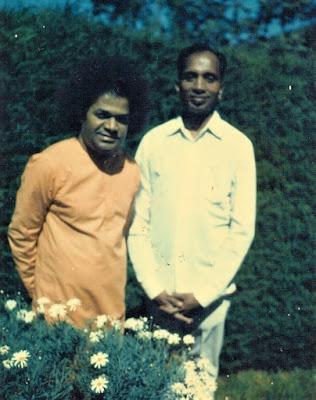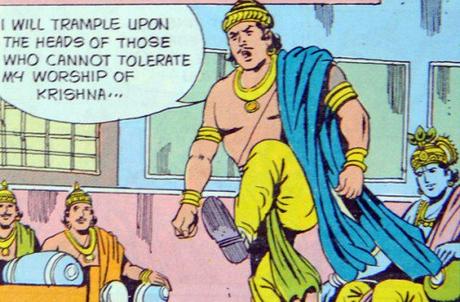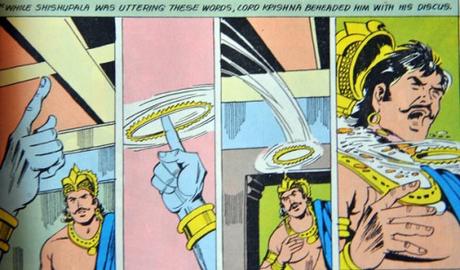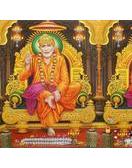Viernes, 08 de junio 2018
Manejo de la crítica, y el Abuso - La sabiduría de Sri Sathya Sai Baba
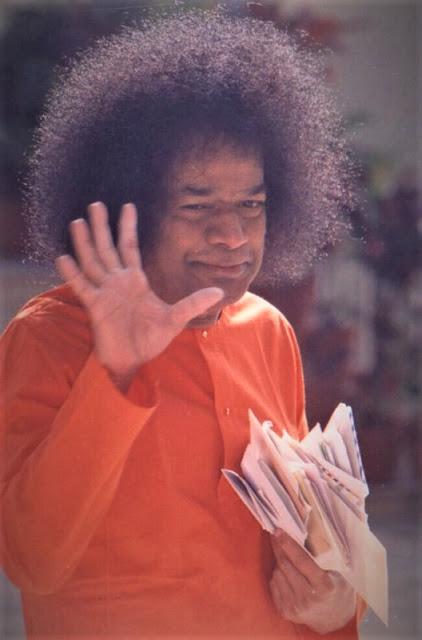 Fórmula Sathya Sai mientras se enfrenta a la crítica
Fórmula Sathya Sai mientras se enfrenta a la críticaTodo el mundo se enfrenta a la crítica. Incluso los propios dioses no están a salvo de la crítica. Pero entonces, ¿cómo uno se enfrenta a la crítica determina lo que uno becomes.That es lo que la historia popular de un burro que cayó en el pozo nos dice. Cuando el burro cayó en el pozo, que bramó en voz alta. A 'enterrar' el sonido irritante, todo el mundo vino y arrojó lodo en el pozo. El burro sin embargo mantuvo omiso de la suciedad de su cuerpo y no se dejó a ser enterrados debajo de ella. Por último, se hizo uso del montículo de barro que había recogido en el pozo para realmente salir del pozo! La crítica puede ser utilizado de manera constructiva! De hecho, 'crítica constructiva' en realidad depende de la actitud de un ser criticado y no en la actitud de la critica.
Bhagavan Sri Sathya Sai Baba (Swami como se le llama cariñosamente y reverentemente) dice,"Digamos que alguien le ha criticado. Te enojas / molesto. Cuando te enojas / malestar, no reaccione inmediatamente. Piensa a sí mismo,-¿Tengo en mí los defectos que han sido señaladas por ellos? Si en el caso, esos defectos hay en mí, entonces, no es que mi error enojarse / molesto con ellos? Sin embargo, si los defectos señalados por ellos no están presentes en mí, entonces ¿por qué debería enojarse / molesto con ellos?'Si así dar una oportunidad para que dicha investigación y pasar tiempo en la introspección, la ira va a disminuir."(Del público discurso el 24 de mayo de 1992 )
Swami, en ese mismo discurso, da un ejemplo personal para que quede claro. "Cuando la gente me llaman Buttatala Sai Baba (Baba con una cabeza en forma de cesto), puede parecer un insulto. Sin embargo, tengo una cabeza de cesta! Por lo tanto, debo aceptar que esto es cierto. Pero si me llaman Pattatala Sai Baba (Baba con una cabeza calva), entonces esto no es cierto; ¿por qué me debo aceptarlo? Por lo tanto, si se mencionan las manchas que no existen en mí justo en frente de mí, incluso entonces no voy a aceptarlo. Ese es el tipo correcto de determinación. Debe tener confianza en sí mismo ".Extrapolando la misma lógica, si la crítica es sólo parcialmente cierto, uno puede aceptar (y corregir si es necesario) la parte solo, dejando ir el resto.
En un discurso público durante el curso anual de verano en la cultura india y Espiritualidad celebrado en Bangalore en 1990, Swami dijo,"Santo Tukaram tenía buenas sensaciones y así, dio una interpretación favorable para igualar el comportamiento grosero y negativo de su esposa. Sus sentidos no se interponen en el camino de su progreso espiritual y la ecuanimidad, a pesar de circunstancias difíciles en su familia. Del mismo modo, Sant Kabir siempre estaba ocupado en el recuerdo de Dios. Por lo tanto el comportamiento de su esposa era armonioso y propicio para su avance espiritual, Einstein, también, tenía la calidad de la ecuanimidad en él y, por tanto, no es en absoluto molesto por el comportamiento bullicioso de su esposa era. De todos estos casos, es evidente que lo que hay que hacer es armonizar sus propios pensamientos y sentimientos a través adecuada sadhana (disciplina espiritual), en lugar de culpar al medio ambiente u otras personas por sus defectos ".Bueno, eso lo resume todo y pone de relieve la verdad que si la crítica es constructiva o destructiva depende de la actitud y la práctica espiritual de la una frente a la crítica.
Un caso especial: Crítica de la propia Guru
Para muchos devotos Sai-(y supongo que es el caso para los devotos / seguidores de otros Gurus / Masters así), hay una crítica que es difícil de superar - la crítica de uno de Maestro / Guru/ Dios / religión. Recuerdo cómo mi sangre cada vez que haya hervido He leído en gran medida inventado y apresuradamente escrito artículos en mi Swami por los periodistas a medio cocer, cuyo único objetivo parece ser la captura de los globos oculares a cualquier precio. También hay algunas personas en Internet (no voy a nombrarlos y contaminar mi blog o mentes de los lectores) que hacen publicidad de dinero y construir una reputación por sí mismos al focalizar específicamente Swami utilizando las buenas o las malas (en su mayoría crook). Ellos médico imágenes, medios cita fuera de contexto y escupir veneno de camuflarlo como el periodismo científico. Y me enfado y malestar. posiblemente, pueda aprender a soportar críticas cuando me preocupa pero cuando un ser que he experimentado personalmente durante dos décadas para ser una personificación del amor, el sacrificio y la abnegación es injustamente criticado, pozos justa ira dentro. Es casi como si yo soy incapaz de soportar que alguien injustamente abusos mi padre o madre! ¿Que debería hacer entonces?
la experiencia del Prof. Nanjundaiah con Swami en relación con esto es muy esclarecedor y liberador.
Una unidad para recordar - una solución de Swami
Prof. Nanjundaiah comenzó su asociación con Swami en la década de 1970 como profesor del comercio en la universidad Brindavan y se retiró como el controlador de los exámenes del Instituto Sri Sathya Sai de Educación Superior. En el año 1974, unos periódicos indios instigados por algunas personalidades influyentes, publicaron artículos feroces que atacan Baba. Muchas acusaciones sin fundamento y sin fundamento se hicieron durante la campaña de difamación y los devotos fueron todos muy dolidos, el profesor Nanjundaiah incluido. No es posible encontrar cualquier otra expresión de su dolor y la rabia, escribió una carta a Swami. En esa carta, oraba a Swami para asegurar por Su Divina Voluntad que estas personas no escriben (o comunicar de cualquier otra manera) tales cosas acerca de Swami nunca! Durante un darshan sesión en Brindavan, le dio la carta a Swami y Swami aceptó.
Un joven Nanjundaiah con su Bhagavan
Unos días más tarde, como Swami iba a entrar en su coche, se le hizo señas al Prof. Nanjundaiah. Él le dijo que se sentara junto a él en el coche! Durante el trayecto, Swami preguntó,"¿Cuál fue la carta que escribió a todos conmigo?""Swami, tengo una oración. He leído cosas tan horribles contra usted en los periódicos. Es muy doloroso para leer este tipo de cosas. Swami, por favor velar por que estas personas no escriben estas críticas contra usted ".Para su sorpresa, el profesor Nanjundaiah vio que Swami parecía estar molesto con su declaración! Swami dijo,"¡Sí! No se debe orar de esa manera! Al igual que usted tiene el derecho a amarme, tienen el mismo derecho a criticar a mí. Yo respeto sus sentimientos y los bendiga. La libertad se ha dado a todos y debe ser respetada. El uso o mal uso de la libertad es una elección que se hace y en función de las decisiones tomadas, no tendrá consecuencias. Usted puede hacer su elección, pero no limitar las opciones de los demás. No se debe orar de esa manera!"No es la de dar por vencido fácilmente, Prof. Nanjundaiah modificado su oración:"En ese caso, Swami, yo deseo que tales palabras en su contra no deben llegar a mi atención." Inmediatamente Swami parecía enfriarse. Su 'ira' había servido el propósito y ahora Él pidió a la sonrisa a desempeñar su papel como su instrumento. con un brillo en los ojos dijo:"Ah que puede orar!"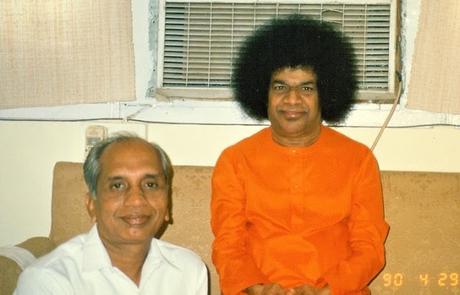
El uso de la libertad es una opción que te puede llevar más cerca de Dios - o lejos de Dios!
Prof Nanjundaiah con Swami.
"Él es mi Dios!", Diría, "Y así que por favor no me hagas daño de nuevo por ahora han experimentado la irritación y la ira que he experimentado." A veces se llevaría a puñetazos. Tengo muchas cicatrices de esas peleas y también han dejado cicatrices en los que criticaron Swami!
Pero ahora, yo personalmente uso la oración que el Prof. Nanjundaiah hizo ese día a Swami y he visto que la magia suceda. A menos que vaya en busca de ella (por razones académicas y otros), nunca he encontrado ninguna crítica o acusación contra mi Swami!
Cómo Dios se ocupa de los que abusan y criticar
Cuando observamos la vida de Swami, Su respuesta a sus críticos siempre ha seguido su fórmula dirección de 'Be-Do-See-Tell'. Al igual que el majestuoso elefante, que nada se preocupa por las diminutas garrapatas que tratan de chupar la sangre de su cuerpo, Swami nunca se molestó en respuesta a la crítica injusta nacido de los celos y la malicia. En lugar de ello, continuó 'ser' lo que Él es y 'hacer' cosas para que Sus acciones hacen todo el hablar. Él sería 'ver' la necesidad de 'contar' y hablar sobre este asunto en raras ocasiones solos y que también, en beneficio de las personas y los devotos de todo.
Una forma en que se comunica Swami cómo Dios (en este caso, el Señor Krishna) se ocupa de los críticos es a través de la narración de un episodio de la gran historia de la India, el Mahabharata. El episodio del rey Chedi, Shishupala es el más esclarecedor en la comprensión de la verdad que, incluso los llamados 'críticos' y 'Dios golpeadores' son una parte del plan cósmico.
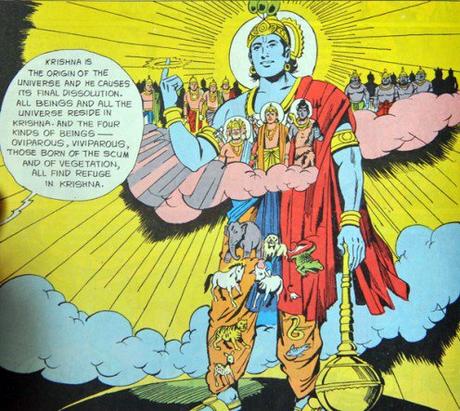
Crédito foto: Chitra Katha Amar
Es una historia muy interesante y edificante aparte de ser esclarecedor. Antes de eso, sólo un pensamiento. Apreciamos el placer y la alegría sólo por el dolor y la tristeza. De lo contrario, no hay nada como un punto de referencia! Agradecemos la luz sólo a causa de la oscuridad. Oscuridad, como tal, no existe - es sólo la ausencia de luz. Así también, todo lo que consideramos 'Dios' y 'anti-Dios son las dualidades que existen y dan sentido a la otra. Dios no puede ser apreciado sin el "anti-Dios. Ahora, vamos a proceder al episodio Shishupala.Palabras de veneno que el dolor del corazón de un devoto - La historia de Shichupala
El alto-más entre los Pandavas, Yudhishtra, acaba de terminar el yagna Rajasooya (empresa de sacrificio, donde un rey vence todos los demás reyes y unifica todo el mundo en un solo reino). Al final de la ceremonia, el gobernante es ofrecer culto a todos los demás reyes y sabios del reino, un acto que simboliza que es una regla simplemente como un instrumento. Así que él busca las bendiciones de todos. Los hermanos Pandavas deciden por unanimidad a ofrecer los primeros libaciones a su Señor Krishna.
Incluso cuando lo hacen, el rey de Chedi, Shishupala (hijo de la tía de Krishna y por lo tanto su primo), se eleva. Ha sido celoso de Krishna todo el tiempo. Y estos celos se ve como él habla con ira,"Oh Pandavas! Esta es una ofensa intencionada del honor de los reyes. Y no puedo ser parte de esta violación de Dharma (rectitud). Si ha elegido a reverenciar Krishna primero porque es un anciano, entonces ¿por qué ignoras Vasudeva, el padre de Krishna? Si lo elige como bienqueriente, entonces ¿qué pasa Drupada, su padre-en-ley? Si lo consideran como su maestro, entonces ¿por qué se descuida la gran Drona que ha enseñado a todos ustedes todas sus habilidades? Si se piensa en él como un hombre de Dios, entonces ¿cómo se puede insultar a la gran Ved Vyasa (hijo de Brahma y el compositor de la misma Mahabharata)? "
¿Cómo pueden los Pandavas dicen Shishupala que para ellos, Krishna es Dios y por lo tanto, más allá de todos estos lazos mundanos y honores?
Y luego, Shishupala procede a condenar el Señor Krishna de la manera más vil y virulenta. "Krishna es un simple ladrón que robó la mantequilla de las casas de otros toda su infancia. Él es el que robó las pastorcillas de vacas inocentes de sus saris, ultrajar su modestia y disfrutando de diversión y la fiesta con ellos. Es un insulto a esta etapa y ceremonia que un vaquero tales maliciosa será el primero en recibir honores!"
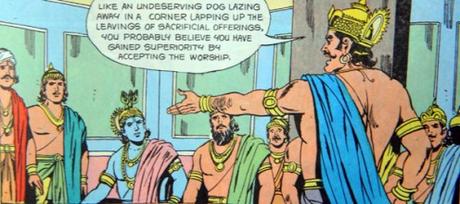
Shishupala fue implacable en su condena y crítica del Señor Krishna. Crédito foto: Chitra Katha Amar
Las reacciones de los diversos personajes en el conjunto variaron.Yudhisthira, el mayor y más humilde entre los hermanos Pandavas, va a Shishupala y habla con gran respeto, "Señor entre los hombres! No hable así en la ira. He aquí los muchos reyes aquí que son mucho mayores que tú. Ellos aprueban el culto de Krishna. Por lo tanto, no es derecho a herir los sentimientos de muchas personas por lo tanto con su arrebato ".
El abuelo, el gran y poderoso Bheeshma, se levanta y truenos,"No veo en este montaje de cualquier persona que no está sometido por la gloria de Krishna. Por lo tanto, voy a ceder a Krishna solo y ninguna otra! Krishna es supremo en la fuerza y la sabiduría y no me importa nada de lo que otros sienten en este sentido ".
El más joven entre los Pandavas, Sahadeva tiene bastante otra reacción. El grita,"Voy a pisotear la cabeza de aquellos que no pueden tolerar mi adoración de Krishna! Voy a luchar contra estas personas hasta la muerte si es necesario!"
La furia de Sahadeva. Crédito foto: Chitra Katha Amar
Las otras reacciones de todos yacían en algún lugar entre estos en el espectro. Pero ninguno de ellos convence Shishupala que se niega a adherirse. Uno puede llevar un caballo al agua, pero es el caballo que debe beber. Uno puede ofrecer explicaciones científicas, emocional y espiritual, pero el crítico debe tener la voluntad de aceptar! Ahora, Shishupala habla en una vena que nadie se imagina. Presenta todas las hazañas gloriosas de Krishna - hazañas por la que se adora - en una luz que sólo el torcido en la mente puede pensar. Él dice,
"Las personas que adoran por matar a los demonios. No eran más que los caballos, los toros y aves. ¿Qué es tan grande en eso. El amor de la gente hizo una montaña de un grano de arena. Usted ha planteado un hormiguero y la gente dice que levantó la montaña Govardhana! Usted mató a Kamsa, el rey del lugar donde creció. Es que no deslealtad al rey? Qué verguenza. Usted no tiene el poder de ser un hombre ni la modestia de ser una mujer. Usted es un eunuco ".
Al oír esto, surge otra reacción, esta vez en Bhima - el segundo hermano Pandava. Se precipita hacia adelante sin habla a rasgar Shishupala pero él está restringido por muchos otros que sienten que la santidad de la ocasión será destruido por tal acto.
¡Pero espera! ¿Cuál es la reacción del Señor Krishna a todo esto ?? Krishna sólo se sienta en el trono, sonriendo. Parece lo más mínimo perturbado o afectado. Para él, todo es parte de la obra divina! ¿Cuál fue el motivo de tal reacción del Señor Krishna? Era porque sabía que el pasado - la historia del nacimiento de Shishupala.
La respuesta de Aquel que conoce el pasado, presente y futuro
Shishupala nació con tres ojos, cuatro brazos y el aullido que sonaba como el rebuzno de un burro. Cuando los padres decidieron abandonar el niño mirando el terrible aspecto, se escuchó una voz incorpórea, que dijo:"El niño no va a morir. Está destinado a ser matado solamente por su destructor que ya ha nacido ".La madre aterrorizada oró para saber el asesino de su hijo cuando la voz de nuevo en auge,"Él será muerto por él en cuyo regazo sus apéndices adicionales caen y desaparecen tercer ojo".Eso ocurrió cuando el Señor Krishna había recogido el niño. Temiendo por su hijo, la madre, la tía de Krishna oró,"Krishna! Prométeme que no se va a enojar en Shishupala y perdonarlo incluso cuando él se irrita con el nivel de matarlo ".Krishna prometió,"Incluso cuando Shishupala me irrita hasta el punto de matar a él, voy a perdonarlo un centenar de veces."
Por lo tanto, sólo el Señor tiene una sonrisa en su rostro. Al sentirse protegido por la promesa Krishna había dado, Shishupala sigue y sigue, sin obstáculos. Toda la corte está enojado y quiere matar Shishupala pero dado que Krishna no hace nada, no hacen nada.
Shishupala también es astuto. Se detiene exactamente en un centenar de abusos. Krishna sonríe y dice,"Me he dado todos estos insultos a la preocupación por la hermana de mi padre. Ignoremos Shishupala y seguir con el proceso ".Bheeshma añade,"Al perdonar la vil de lengua como Shishupala, Krishna muestra su grandeza y el amor. críticas incluso de Shishupala es la voluntad de Krishna. El rey de Chedi, Shishupala, no tiene voluntad propia ".Shishupala es incapaz de soportar más esto. Su ego está herido y su lengua amarre continúa. ¡Pero Ay! Los cien insultos están en marcha y el Señor Krishna instantánea recoge el Tamboola placa (una placa en la que se hacen ofrendas a Dios / ancianos) y lo lanza hacia Shishupala. La placa se convierte en un arma que va cortando su cuello! La garganta es silenciada para siempre.
El rey poderoso, valiente y gran Shishupala se encuentra con su muerte en un instante en las manos del Señor.
Crédito foto: Chitra Katha Amar
Lo que sucede después es hermoso. El Señor camina hasta el cadáver y sus respetos. El alma de Shishupala se eleva como una bola de luz y se funde en Krishna! Por lo tanto Krishna retribuye las palabras de la falta Shishupala derramado sobre él con el mayor regalo que un devoto busca - fusión en Él!
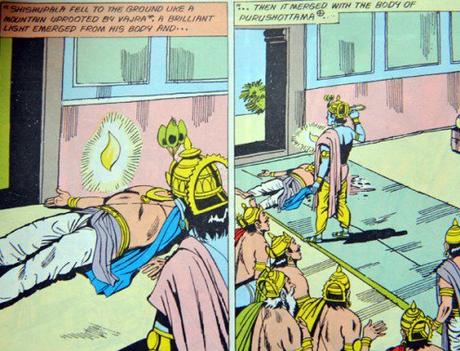
Cuando uno cree que todo es la voluntad de Dios, uno no debe verse afectada por la existencia de la crítica y la crítica.
Crédito foto: Chitra Katha Amar
Si me necesitas, me merece
Cuando Swami narra este episodio, nos dejamos recordaba tanto del mismo Swami. El derrama el amor en todo el mundo - con independencia de que lo aman o lo odian. El devoto se agita en ver al Señor criticado pero el Señor no lo hace - porque Él es consciente del pasado, presente y futuro. Todo el mundo no es más que un personaje en el gran drama llamado vida para la cual Él es el director.
El 'devoto' y 'crítico' ambos tienen sus papeles. El resultado final es el mismo para ambos - fusión en el Señor. Si pensamos en ello, a menudo el 'crítico' piensa acerca de Dios más intensamente y apasionadamente en comparación con el 'devoto'!
Swami dice, "Si me necesita, me merece."
Aquellos que no quieren reconocer a Dios, alejarse de él, actuar en contra de sus palabras y critican a él - no lo necesitan más? Por lo tanto, resolví, la próxima vez que alguien condena y critica mi Dios o lo traiciona no me va a enojar. Voy a simpatizar con el 'crítico' / 'traidor' y orar por él / ella. Al igual que Krishna se duchaba el último amor de Shishupala y así como Swami derrama Su amor en todo, yo también trataré de enviar mi amor a la 'crítica' / 'traidor'. Y si no puedo hacer eso, lo menos que puedo hacer es simplemente lo ignoran el / ella al igual que todos en la corte del rey ese día ignorada Shishupala. El Señor cuidará!
La misma fórmula funcionará para aquellos que nos critican también.
"Si la crítica se hace en voz alta, que va en el aire. Si se hace dentro de uno mismo, no hace falta solamente a uno mismo. Tal es el caso, ¿por qué debería ser perturbado? La crítica sólo le ayudará a progresar. Por lo tanto, no albergan odio hacia los que te critican. Aceptar todo lo bueno que se le presente. Ignorar todo lo que es malo. Placer es un intervalo entre dos dolores. Sombra sigue la luz. No hay que tener miedo de la sombra. Hay luz incluso en la sombra. Luces y sombras no pueden existir por separado. Hay un principio de unidad entre ellos. Por lo tanto, no reaccionan a cualquier crítica dirigida contra Swami o cualquier otro anciano para el caso. Simplemente, cepilla a un lado, diciendo que no tienen nada que ver con ello. Si alguien señala errores en que, ciertamente puede rectificarlos. Sin embargo, si los niveles de alguien falsas acusaciones en su contra, usted no necesita preocuparse sobre ella. La gente puede alabar o criticar, pero ninguno puede sacudir Sai. Sai vive en la verdad. Ninguno de ellos ha sido capaz de librarse de la verdad en cualquier punto del tiempo. Lleven sus vidas con tal convicción fuerte. Aumentar su fe en Dios día a día. A medida que aumenta la fe, todo el mal perecerá. No renunciar a las prácticas espirituales que usted ha estado haciendo todo el tiempo.
- Discurso Divino por Baba el 25 de diciembre el año 2000
Friday, 8 June 2018
Handling Criticism, and Abuse - Wisdom from Sri Sathya Sai Baba
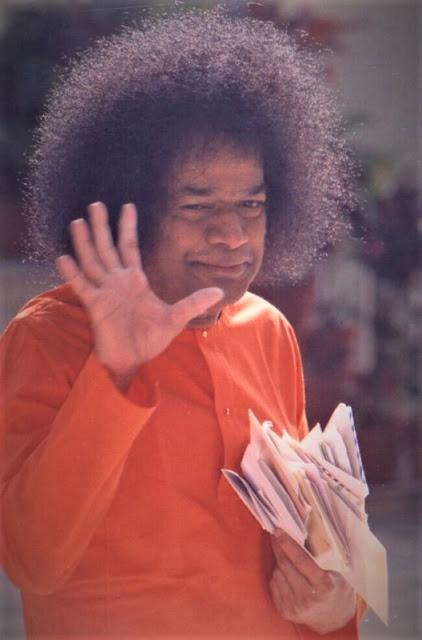
Everyone faces criticism. Even the Gods themselves are not spared of criticism. But then, how one faces the criticism determines what one becomes.That's what the popular story of a donkey that fell in the well tells us. When the donkey fell in the well, it brayed out loud. To 'bury' the irritating sound, everyone came and threw mud into the well. The donkey however kept shrugging off the dirt from its body and did not allow itself to get buried under it. Finally, it made use of the mound of mud which had collected in the well to actually get out of the well! Criticism can be used constructively! In fact, 'constructive criticism' actually depends on the attitude of the one being criticised and not on the attitude of the one criticising.
Bhagawan Sri Sathya Sai Baba (Swami as He is reverentially and endearingly called) says,"Let us say somebody has criticized you. You get angry/upset. When you get angry/upset, do not react immediately. Think to yourself, 'Do I have in me the defects that have been pointed out by them? If in case, those defects are there in me, then, is it not my mistake to get angry/upset with them? However, if the blemishes pointed out by them are not present in me, then why should I get angry/upset with them?'If you thus give an opportunity for such an enquiry and spend time in introspection, your anger will subside." (From public discourse on 24th May 1992)
Swami, in that same discourse, gives a personal example to make it clear. "When people call Me Buttatala Sai Baba (Sai Baba with a basket-like head), it may seem insulting. But, I do have a basket-like head! Therefore, I must accept this is true. But if they call Me Pattatala Sai Baba (Sai Baba with a bald head), then this is not true; so why I should I accept it? Therefore, if blemishes that are not there in me are mentioned right in front of me, even then I will not accept it. That is the right kind of determination. You must have self-confidence."Extrapolating the same logic, if the criticism is only partially true, one can accept (and correct if necessary) that part alone, letting go of the rest.
In a public discourse during the annual Summer Course in Indian Culture and Spirituality held at Bangalore in 1990, Swami said,"Saint Tukaram had good feelings and so, he gave a favourable interpretation to even the rude and negative behaviour of his wife. His senses did not stand in the way of his spiritual progress and equanimity, despite trying circumstances in his family. Likewise, Sant Kabir was always engaged in remembrance of God. So his wife's behaviour was harmonious and conducive to his spiritual advancement, Einstein, too, had the quality of equanimity in him and was therefore not at all upset by the boisterous behaviour of his wife. From all these instances, it is evident that what you need to do is to harmonise your own thoughts and feelings through proper sadhana (spiritual discipline), rather than blame the environment or other persons for your shortcomings."Well, that sums it all up and highlights the truth that whether criticism is constructive or destructive depends on the attitude and sadhana of the one facing criticism.
A special case: Criticism of one's Guru
For many Sai-devotees (and I presume it is the case for devotees/followers of other Gurus/Masters as well), there is one criticism that is hard to overcome - the criticism of one's Master/Guru/God/Religion. I remember how my blood has boiled whenever I have read heavily concocted and hastily written articles on my Swami by half-baked journalists whose sole goal seems to be capturing eyeballs at any cost. There are also some people on the internet (I will not name them and pollute my blog or the readers' minds) who make ad-money and build a reputation for themselves by specifically targeting Swami using hook or crook (mostly crook). They doctor images, quote media out of context and spit venom camouflaging it as scientific journalism. And I get angry and upset. I can possibly learn to stand criticism when it concerns me but when a being that I have personally experienced for two decades to be an epitome of love, sacrifice and selflessness is unfairly criticised, righteous anger wells up within. It is almost like I am unable to bear it if someone unfairly abuses my father or mother! What should I do then?
Prof. Nanjundaiah's experience with Swami regarding this is very enlightening and liberating.
A drive to remember - a solution from Swami
Prof. Nanjundaiah started his association with Swami in the 1970s as a lecturer of commerce in the Brindavan college and retired as the Controller of Examinations of the Sri Sathya Sai Institute of Higher Learning. In the year 1974, a few Indian newspapers instigated by some influential personalities, carried vicious articles attacking Baba. Many unfounded and baseless allegations were made during the smear campaign and the devotees were all very pained, Prof Nanjundaiah included. Unable to find any other expression of his hurt and anger, he wrote a letter to Swami. In that letter, he prayed to Swami to ensure by His Divine Will that such people don't write (or communicate in any other way) such things about Swami ever! During a darshan session at Brindavan, he gave the letter to Swami and Swami accepted it.
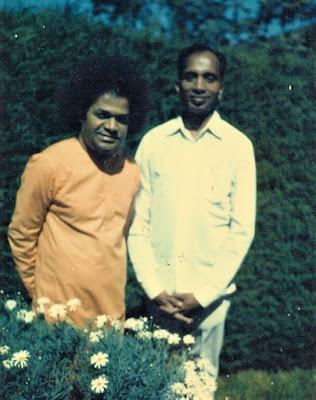
A young Nanjundaiah with his Bhagawan
A few days later, as Swami was going into His car, He beckoned to Prof. Nanjundaiah. He told him to sit alongside Him in the car! During the drive, Swami asked,"What was that letter you wrote to me all about?""Swami, I have a prayer. I have read such horrible things against you in the newspapers. It is really painful to read such things. Swami, please see to it that these people do not write such criticisms against you."Much to his shock, Prof Nanjundaiah saw that Swami seemed to get upset with his plea! Swami said,"Ay! You should not pray like that! Just as you have the right to love Me, they have an equal right to criticize Me. I respect their feelings and bless them. Freedom has been given to all and it should be respected. Use or misuse of freedom is a choice that is made and depending on the choices made, there will have consequences. You can make your choice but not limit other's choices. You should not pray like that!"Not the one to give up easily, Prof. Nanjundaiah amended his prayer saying,"In that case Swami, I pray that such words against you should not reach my attention." Immediately Swami seemed to cool down. His 'anger' had served the purpose and now He called upon the smile to play its role as His instrument. With a twinkle in His eye He said,"Ah that you can pray!"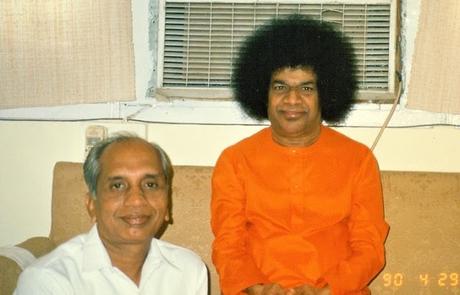
The use of freedom is a choice that can take you closer to God - or away from God!
Prof Nanjundaiah with Swami.
"He is my God!", I would say, "And so please do not hurt me again for you have now experienced the irritation and anger that I have experienced." Sometimes it would lead to fistfights. I have many scars from such fights and have also left behind scars on those that criticized Swami!
But now, I personally use the prayer that Prof. Nanjundaiah made that day to Swami and I have seen the magic happen. Unless I go searching for it (for academic and other reasons), I never come across any criticism or allegation against my Swami!
How God deals with those that abuse and criticise
When we observe Swami's life, His response to His critics has always followed His leadership formula of 'Be-Do-See-Tell'. Like the majestic elephant which cares nought for the tiny ticks that try to suck blood from its body, Swami never bothered replying to unfair criticism born of jealousy and malice. Instead, He continued to 'be' what He is and 'do' things so that His actions do all the speaking. He would 'see' the need to 'tell' and speak about this matter on rare occasions alone and that too, for the benefit of the people and devotees around.
One way in which Swami communicates how God (in this case, Lord Krishna) deals with critics is through the narration of an episode from the great history of India, the Mahabharata. The episode of the Chedi king, Shishupala is the most enlightening in understanding the truth that, even the so called 'critics' and 'God-bashers' are a part of the cosmic plan.
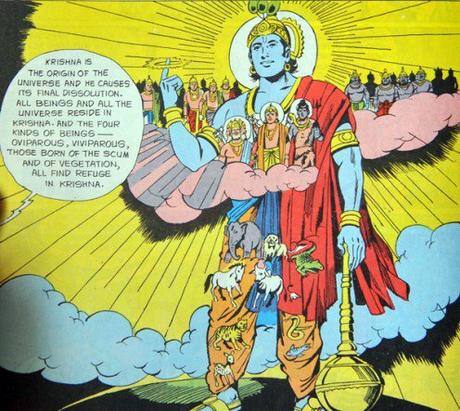
Pic credit: Amar Chitra Katha
It is a very interesting and uplifting story apart from being enlightening. Before that, just one thought. We appreciate pleasure and joy only because of pain and sorrow. Otherwise, there is nothing like a reference point! We appreciate light only because of darkness. Darkness as such does not exist - it is only the absence of light. So too, everything that we consider 'God' and 'anti-God' are the dualities that exist and give meaning to each other. God cannot be appreciated without the 'anti-God'. Now, let us proceed to the Shishupala episode.Words of venom that pain a devotee's heart - Shichupala's story
The senior-most among the Pandavas, Yudhishtra, has just completed the Rajasooya yagna ( a sacrificial undertaking where a king conquers all the other kings and unifies the whole world into a single kingdom). At the end of the ceremony, the ruler is to offer worship to all the other kings and sages in the kingdom, an act which symbolises that he is a ruler merely as an instrument. So he seeks everyone's blessings. The Pandava brothers unanimously decide to offer the first libations to their Lord Krishna.
Even as they do so, the Chedi king, Shishupala (the son of Krishna's aunt and thus His cousin), rises. He has been jealous of Krishna all the while. And this jealousy is seen as he speaks out in anger,"Oh Pandavas! This is a wilful affront of the honor of kings. And I cannot be party to this violation of Dharma (righteousness). If you have chosen to revere Krishna first because he is an elder, then why do you ignore Vasudeva, Krishna's father? If you choose him as a well-wisher, then what about Drupada, your father-in-law? If you consider him as your teacher, then why do you neglect the great Drona who has taught all of you all your skills? If you think of him as a godly man, then how can you insult the great Ved Vyasa (son of Brahma and the composer of the Mahabharata itself)? "
How can the Pandavas tell Shishupala that for them, Krishna is God and hence, beyond all these worldly ties and honors?
And then, Shishupala proceeds to condemn Lord Krishna in the most vile and virulent manner. "Krishna is a mere thief who stole butter from others' houses all his childhood. He is the one who robbed the innocent cowherd girls of their saris, outraging their modesty and indulging in fun and frolic with them. It is an insult to this stage and ceremony that such a sly cowherd be the first to receive honours!"
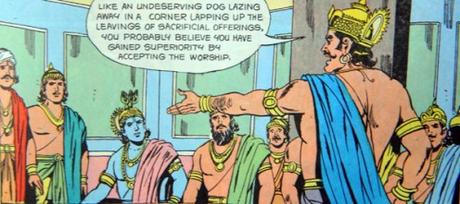
Shishupala was ruthless in his condemnation and criticism of Lord Krishna. Pic credit: Amar Chitra Katha
The reactions of the various personages in the assembly varied.Yudhisthira, the eldest and humblest among the Pandava brothers, goes to Shishupala and speaks with great respect, "Lord among men! Do not speak thus in anger. Behold the many kings here who are much older than you. They approve the worship of Krishna. So, it is not right to hurt so many people's feelings thus with your outburst."
The grandsire, the great and mighty Bheeshma, rises and thunders,"I do not see in this assembly any person who is not subdued by the glory of Krishna. Therefore, I shall bow to Krishna alone and none other! Krishna is supreme in might and wisdom and I care nothing about what others feel in this regard."
The youngest among the Pandavas, Sahadeva has quite another reaction. He shouts,"I shall trample upon the heads of those that cannot tolerate my worship of Krishna! I shall fight such people unto death if necessary!"
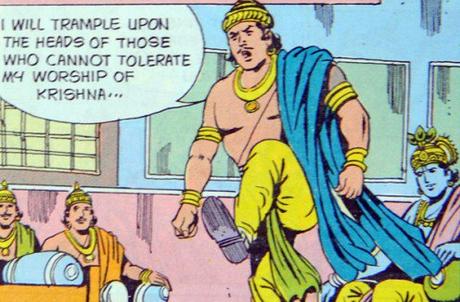
Sahadeva's fury. Pic credit: Amar Chitra Katha
The other reactions all lay somewhere in between these in the spectrum. But none of them convinces Shishupala who refuses to accede. One can take a horse to the water, but it is the horse that must drink. One can offer scientific, emotional and spiritual explanations but the critic must have the willingness to accept! Now, Shishupala speaks in a vein that nobody ever imagines. He presents all the glorious feats of Krishna - feats for which he is worshipped - in a light that only the crooked in the mind can think about. He says,
"People worship you for killing demons. They were nothing but horses, bulls and birds. What is so great in that. The love of the people made a mountain of a molehill. You raised an anthill and people say you lifted the Govardhana mountain! You killed Kamsa, the king of the place where you grew. Is that not disloyalty to the king? Shame on you. You do not have the might to be a man nor the modesty to be a woman. You are a eunuch."
Hearing this, another reaction arises, this time in Bheema - the second Pandava brother. He rushes forward without speech to tear open Shishupala but he is restrained by many others who feel that the sanctity of the occasion will be destroyed by such an act.
But wait! What is the reaction of Lord Krishna to all this?? Krishna just sits on the throne, smiling. He seems the least perturbed or affected. For Him, it is all part of the Divine play! What was the reason for such a reaction from Lord Krishna? It was because he knew the past - the story of Shishupala's birth.
The response of the One who knows the past, present and future
Shishupala was born with three eyes, four arms and the wail which sounded like the braying of a donkey. When the parents decided to abandon the child beholding the terrible appearance, an incorporeal voice was heard which said,"The child will not die. It is meant to be killed only by its destroyer who has already taken birth."The terrified mother prayed to know the slayer of her son when the voice again boomed,"He will be slain by him on whose lap his extra appendages fall off and third eye disappears."That happened when Lord Krishna had picked up the child. Fearing for her son, the mother, Krishna's aunt prayed,"Krishna! Promise me you will not get angry on Shishupala and forgive him even when he angers you to the level of killing him."Krishna promised,"Even when Shishupala angers me to the point of slaying him, I shall forgive him a hundred times."
Thus, the Lord only has a smile on his face. Feeling protected by the promise Krishna had given, Shishupala goes on and on, unhindered. The whole court is angry and wants to kill Shishupala but since Krishna does nothing, they do nothing.
Shishupala is also cunning. He stops exactly at a hundred abuses. Krishna smiles and says,"I have borne all these insults out of concern for my father's sister. Let us ignore Shishupala and go about the proceedings."Bheeshma adds,"In forgiving the vile-tongued one as Shishupala, Krishna shows his greatness and love. Even Shishupala's criticism is Krishna's will. The king of Chedi, Shishupala, has no will of his own."Shishupala is unable to bear this anymore. His ego is hurt and his lashing tongue continues. But alas! The hundred insults are up and Lord Krishna instantly picks up the Tamboola plate (a plate on which offerings are made to God/elders) and throws it towards Shishupala. The plate becomes a weapon that slices away his neck! The throat is silenced forever.
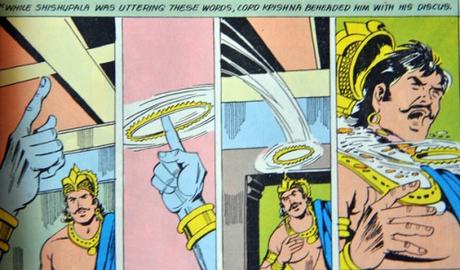
The powerful, brave and great king Shishupala meets his death in an instant at the Lord's hands.
Pic credit: Amar Chitra Katha
What happens next is beautiful. The Lord walks up to the corpse and pay His respects. The soul of Shishupala rises like a ball of light and merges into Krishna! Krishna thus repays the foul words the Shishupala showered on Him with the greatest gift a devotee seeks - merger in Him!

When one believes that everything is God's will, one should not be affected with the existence of critics and criticism.
Pic credit: Amar Chitra Katha
If you need me, you deserve me
When Swami narrates this episode, we get reminded so much of Swami Himself. He showers love on everyone - irrespective of whether they love Him or hate Him. The devotee gets agitated on seeing the Lord criticized but the Lord does not - because He is aware of the past, present and future. Everyone is but a character in the grand drama called life for which He is the director.
The 'devotee' and 'critic' both have their roles. The final result is same for both - merger in the Lord. If we think about it, often the 'critic' thinks about God more intensely and passionately compared to the 'devotee'!
Swami says, "If you need me, you deserve me."
Those that fail to recognize God, turn away from Him, act against His words and criticize Him - don't they need Him the most? So, I resolved, the next time someone condemns and criticizes my God or betrays Him I won't get angry. I shall sympathise with the 'critic'/'betrayer' and pray for him/her. Just as Krishna showered the ultimate love to Shishupala and just as Swami showers His love on all, I too shall try to send my love to the 'critic'/'betrayer'. And if I cannot do that, the least I can do is just ignore him/her just like everyone in the king's court that day ignored Shishupala. The Lord will take care!
The same formula will work for those that criticise us as well.
"If the criticism is made in a loud voice, it goes into the thin air. If it is made within one self, it goes to oneself only. Such being the case, why should you be perturbed? Criticism will only help you to progress. So, do not harbour hatred towards those who criticize you. Accept everything good that comes your way. Ignore all that is bad. Pleasure is an interval between two pains. Shadow follows light. One should not be afraid of shadow. There is light even in shadow. Light and shadow cannot exist separately. There is a principle of unity between them. So, do not react to any criticism levelled against Swami or any other elder for that matter. Just brush it aside, saying, you have nothing to do with it. If someone points out mistakes in you, you can certainly rectify them. But if someone levels false charges against you, you don't need to be worried over it. People may praise or criticize, but none can shake Sai. Sai lives in truth. None has been able to shake truth at any point of time. Lead your lives with such strong conviction. Increase your faith in God day by day. As faith increases, all the wickedness will perish. Do not give up the spiritual practices that you have been doing all along.
- Divine Discourse by Baba on 25th December 2000
FUENTE: https://aravindb1982.blogspot.com/2018/06/handling-criticism-and-abuse-sathya-sai-baba-wisdom.html

